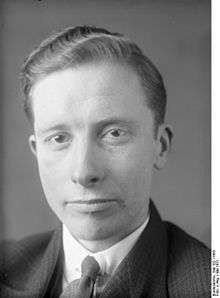Hubert Renfro Knickerbocker
Hubert Renfro Knickerbocker (January 31, 1898 – July 12, 1949) was an American journalist and author. He was nicknamed "Red" from the color of his hair.[1]

Early life
Knickerbocker was born in Yoakum, Texas. Knickerbocker's father was Rev. Hubert Delancey Knickerbocker.
Education
Knickerbocker graduated from the Southwestern University in Texas and then studied psychiatry at Columbia University.[2]
Career
Knickerbocker was a journalist. Knickerbocker was noted for reporting on German politics before and during World War II. From 1923 to 1933 he reported from Berlin, but because of his opposition to Adolf Hitler he was deported when Hitler came to power. On December 1, 1930, Knickerbocker interviewed Soviet leader Stalin's mother, Keke Geladze in Tiflis for New York Evening Post through a Georgian interpreter. The article was titled “Stalin Mystery Man Even to His Mother.”[3]
Back in America, he continued writing about the threat posed by Nazism. On April 15, 1933, he wrote in the New York Evening Post: "An indeterminate number of Jews have been killed. Hundreds of Jews have been beaten or tortured. Thousands of Jews have fled. Thousands of Jews have been, or will be, deprived of their livelihood." In 1931, as a correspondent for the New York Evening Post and the Philadelphia Public Ledger, he won the Pulitzer Prize for "a series of articles on the practical operation of the Five Year Plan in Russia".[4][5]
After World War II, Knickerbocker went to work for radio station WOR, in Newark, New Jersey. He was on assignment with a team of journalists touring Southeast Asia when they were all killed in a plane crash near Bombay, India, on July 12, 1949.[6]
Personal life
Knickerbocker was married first to Laura Patrick in 1918, and they had one son, Conrad, who became a daily book reviewer for The New York Times. His second marriage was to Agnes Schjoldager, with whom he had three daughters, including Miranda, who married actor Sorrell Booke.
Major publications
- Fighting the Red Trade Menace (1931)
- The New Russia (1931)
- Soviet Trade and World Depression (1931)
- The Soviet Five Year Plan and Its Effect on World Trends (1931)
- Can Europe Recover? (1932)
- The German Crisis (1932)
- Germany-Fascist or Soviet? (1932)
- The Truth about Hitlerism (1933)
- The Boiling Point: Will War Come in Europe? (1934)
- ’’Is Tomorrow Hitler’s? 200 Questions On The Battle of Mankind’ (1941)
References
- Preston, Paul (2009). We Saw Spain Die: foreign correspondents in the Spanish Civil War. Skyhorse Publishing, Inc. p. 33. ISBN 978-1-60239-767-5.
- Walter Prescott Webb, Eldon Stephen Branda, The Handbook of Texas vol. 3 (1952), p. 482: "Hubert Renfro Knickerbocker, internationally known writer and Pulitzer Prize-winning journalist, was born in Yoakum, Texas, on January 31, 1898, the son of Rev. Hubert Delancey and Julia Catherine Knickerbocker..."
- Stephen Kotkin. Stalin:Volume 2. New York: Penguin Press. p. 64.
- "Knickerbocker, Hubert Renfro". TSHAOnline. Retrieved 2013-10-31.
- "The Pulitzer Prize: 1931 Winners". The Pulitzer Prizes. Retrieved Mar 9, 2010.
- Doctor, Vikram (30 June 2018). "Anatomy of a crash: Lessons for Indian aviation from a 69-year-old tragedy". The Economic Times. Retrieved 3 April 2020.
External links
- Newspaper clippings about Hubert Renfro Knickerbocker in the 20th Century Press Archives of the ZBW
- Hubert Renfro Knickerbocker Papers, 1914-1950 at the Columbia University Rare Book and Manuscript Library, New York, NY